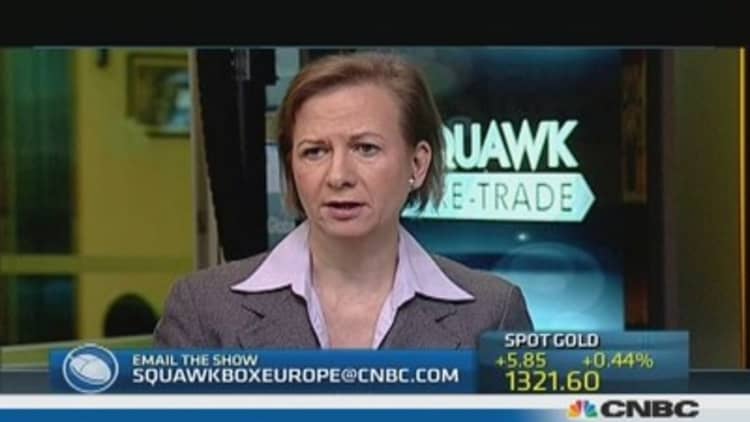
The U.K. gets an annual boost of up to £78 billion ($124 billion) as a result of belonging to the European Union (EU), one of the country's biggest business lobbying groups said on Monday.
EU membership has become an increasingly contentious topic in the U.K., with detractors panning the 28-country union as overly bureaucratic and a threat to individual countries' sovereignty. Political hostility towards the EU has grown in Britain since the onset of the financial crisis, and Prime Minister David Cameron agreed to hold a referendum on membership if his Conservative party wins a majority at the 2015 election.
(Read more: EU battle heats up: '50% chance UK out in 5 years')
However, the Confederation of British Industry (CBI) said the U.K. would be best off as a member of a "reformed" EU, and that membership was worth around 4-5 percent of the country's annual gross domestic product (GDP), or £62-£78 billion.
"We are better off in a reformed EU than outside with no influence. Each year, membership is worth £3,000 to every household in this country," said CBI Director General John Cridland, in a report called "Our global future: the business vision for a reformed EU".
He added: "The EU must modernize the single market by fully implementing a market for services and creating a digital one, and also secure major trade deals with the US, Japan and others."
(Read more: China and euro zone strike currency swap deal)
The CBI expressed unease about the "creeping" extension of the EU's authority, at a time when the EU is edging towards establishing a banking union that will move bank supervision from national to pan-European level.
"I am clear that the ever-closer union of the euro zone is not for Britain. The big reform issue is to ensure that Britain's membership of the Single Market and the EU of the 28 does not become damaged or diluted by the euro zone's drive for greater integration," Cridland said.
The CBI added that the EU had a "strong tendency to regulate", one of the most regularly touted criticisms of the union by the U.K. Issues the EU has sought to regulate include the color of passports, and on Thursday it came under fire for setting a standard amount of water that could be used in flushing toilets.
(Read more: A bum deal? EU to roll out toilet flush law)

"The EU must improve the process for assessing new regulations and reduce the cumulative regulatory burden, particularly on SMEs (small and medium enterprises). Businesses would like to see a moratorium on legislation where there is a case for decisions to be made at national level, such as employment law and 'life-style' regulation," it said.
President of the CBI, Mike Rake told CNBC on Monday that the EU had to balance bureaucracy with reform.
"We're very clear that want to be in the European Union. We think the arguments are overwhelming after looking at this for ten months in great detail but but we do need reform. We do need to see the completion of the single market, we do need to eliminate unnecessary interventions in things that really would be better off left to national countries," he told CNBC Europe's "Squawk Box."
In the meantime, the CBI raised its growth forecasts for the U.K. in 2013 and 2014 on Sunday, citing improving business investment and net trade. It estimated the U.K. would grow by 1.4 percent this year, up on a previous forecast of 1.2 percent.
"The recovery that started in the service sector has fanned out to manufacturing and construction, and is shaping up to be more broad-based. The recovery won't be spectacular, just slow and steady, but appears more solid and better-rooted," said Cridland.
Rake added that the business sector had to play a role in the country's recovery and forecast that businesses would be increasing investment in the near future.
"What we're seeing at the moment is an improvement in confidence which means there's more consumer spending, but what we now need to see is more business investment to ensure that it's sustainable, to improve productivity which allows us to improve the standard of living."
Last month, official GDP numbers showed that Britain's economy expanded in the third quarter, with growth of 0.8 percent on the second quarter.
(Read more: UK may hit foreign property owners with new tax)
—By CNBC's Katy Barnato. Follow CNBC on Twitter: @CNBCWorld


